
LDS Quotes on Secularism & Worldliness

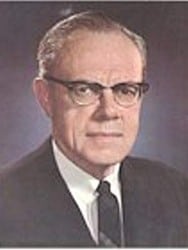
“Someone once asked me, ‘Don’t you think the commandments should be rewritten?’ The answer was, ‘No, they should be reread.'”
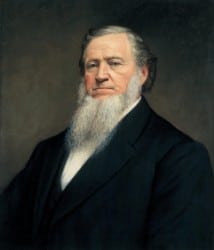
“I am more afraid that this people have so much confidence in their leaders that they will not inquire for themselves of God whether they are led by him. I am fearful that they settle down in a state of blind self-security, trusting their eternal destiny in the hands of their leaders with a reckless confidence that in itself would thwart the purposes of God…Let every man and woman know, by the whispering of the Spirit of God to themselves, whether their leaders are walking in the path the Lord dictates, or not.”
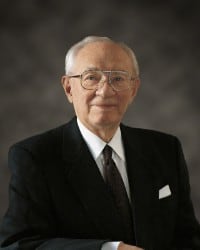
The Sabbath of the Lord is becoming the play day of the people. It is a day of golf and football on television, of buying and selling in our stores and markets. Are we moving to mainstream America as some observers believe? In this I fear we are. What a telling thing it is to see the parking lots of the markets filled on Sunday in communities that are predominately LDS. Our strength for the future, our resolution to grow the Church across the world, will be weakened if we violate the will of the Lord in this important matter. He has so very clearly spoken anciently and again in modern revelation. We cannot disregard with impunity that which He has said.
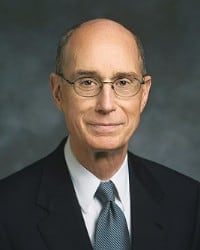
“Your education must never stop. If it ends at the door of the classroom on graduation day, we will fail. And we will need the help of heaven to know which of the myriad things we could study we would most wisely learn. . . .The real life we’re preparing for is eternal life. Secular knowledge has for us eternal significance. Our conviction is that God, our Heavenly Father, wants us to live the life that He does.”

“Underlying this insistence on individual interpretation, is the assumption . . . that the plainest, most evident reading of the text is the proper one. Everyone becomes his or her own theologian. There is no longer any need to consult Augustine or Thomas Aquinas or Martin Luther about their understanding of various passages when you yourself are the final arbiter of what is the correct reading. This tendency, together with the absence of any authority structure within Protestantism, has created a kind of theological free-for-all, as various individuals or groups insist that their reading of the Bible is the only possible interpretation.”
| Mine Eyes Have Seen the Glory: A Journey into the Evangelical Subculture in America, 3rd ed.
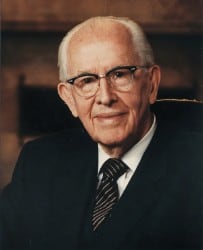
The wolves amongst our flock are more numerous and devious today than when President Clark made this statement. . . .Not only are there apostates within our midst, but there are also apostate doctrines that are sometimes taught in our classes and from our pulpits and that appear in our publications. And these apostate precepts of men cause our people to stumble. . . .
Christ taught that we should be in the world but not of it. Yet there are some in our midst who are not so much concerned about taking the gospel into the world as they are about bringing worldliness into the gospel. They want us to be in the world and of it. They want us to be popular with the worldly even though a prophet has said that this is impossible, for all hell would then want to join us.
Through their own reasoning and a few misapplied scriptures, they try to sell us the precepts and philosophies of men. They do not feel the Church is progressive enough.
| Conference Report, April 1969, p. 11; Book of Mormon Student Manual, pp. 39-40

“Let us never lose sight of the fact that education is a preparation for life — and that preparing for life is far more than knowing how to make a living or how to land on the moon. Preparing for life means building personal integrity, developing a sound sense of values, increasing the capacity and willingness to serve. Education must have its roots in moral principles. If we lose sight of that fact in our attempt to match our educational system against that of the materialists, we shall have lost far more than we could possibly gain.”
| Teachings of Ezra Taft Benson, p. 297


Why do people apostatize? You know we are on the “Old Ship Zion.” We are in the midst of the ocean. A storm comes on, and, as sailors say, she labors very hard. “I am not going to stay here,” says one; “I don’t believe this is the ‘Ship Zion.’ “But we are in the midst of the ocean.” “I don’t care, I am not going to stay here.” Off goes the coat, and he jumps overboard. Will he not be drowned? Yes. So with those who leave this Church. It is the “Old Ship Zion,” let us stay in it.
| Journal of Discourses 10:295; Discourses of Brigham Young, p. 85
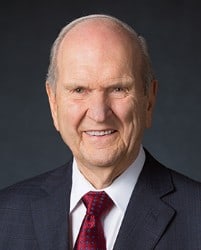
“I testify that the earth and all life upon it are of divine origin. The Creation did not happen by chance. It did not come ex nihilo (out of nothing). And human minds and hands able to build buildings or create computers are not accidental. It is God who made us and not we ourselves. We are His people! The Creation itself testifies of a Creator. We cannot disregard the divine in the Creation. Without our grateful awareness of God’s hand in the Creation, we would be just as oblivious to our provider as are goldfish swimming in a bowl. With deep gratitude, we echo the words of the Psalmist, who said, “O Lord, how manifold are thy works! in wisdom hast thou made them all: the earth is full of thy riches.”

“The early Church creeds were motivated more by political than theological concerns. As William Penn is credited with saying, ‘Persecution entered with creed-making.’ Like-mindedness became a requirement rather than a goal. Orthodoxy, not love and grace, became the central focus. The saved were those Christians who shared our doctrinal creed. It wasn’t enough to claim you were Christian. You had to be the right kind of Christian, a faithful adherent of our religious code. Those within this tight circle were our brothers and sisters, and we were obliged to love them. Those outside our church, denomination, or religion were unsaved.”
| If God Is Love: Rediscovering Grace in an Ungracious World (San Francisco: Harper, 2004), 56, 61

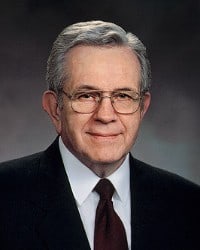
“Many of the social restraints which in the past have helped to reinforce and to shore up the family are dissolving and disappearing. The time will come when only those who believe deeply and actively in the family will be able to preserve their families in the midst of the gathering evil around us.” – Spencer W. Kimball, “Families Can Be Eternal,” Ensign, November 1980, 4.
“The distance between the Church and a world set on a course which we cannot follow will steadily increase. . . . Across the world, those who now come by the tens of thousands will inevitably come as a flood to where the family is safe.”
| “The Father and the Family,” Ensign, May 1994, 21.

“Everywhere around us, in every realm of artistic endeavor, we see evidence of the rejection of traditional standards of beauty and worth. In the visual arts, in literature, in film, in music of both popular and classical variety, ugliness has been enshrined as a new standard, as we accept the ability to shock as a replacement for the old ability to inspire.”
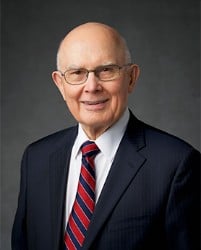
“But here is a caution for families. Suppose Church leaders reduce the time required by Church meetings and activities in order to increase the time available for families to be together. This will not achieve its intended purpose unless individual family members—especially parents—vigorously act to increase family togetherness and one-on-one time. Team sports and technology toys like video games and the Internet are already winning away the time of our children and youth. Surfing the Internet is not better than serving the Lord or strengthening the family. Some young men and women are skipping Church youth activities or cutting family time in order to participate in soccer leagues or to pursue various entertainments. Some young people are amusing themselves to death—spiritual death.”

“The proud stand more in fear of men’s judgment than of God’s judgment. ‘What will men think of me?’ weighs heavier than ‘What will God think of me?’”
| “Beware of Pride,” Ensign, May 1989

“The proud depend upon the world to tell them whether they have value or not. Their self-esteem is determined by where they are judged to be on the ladders of worldly success. They feel worthwhile as individuals if the numbers beneath them in achievement, talent, beauty, or intellect are large enough. Pride is ugly. It says, ‘If you succeed, I am a failure’.”
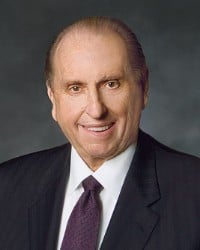
“Beyond our study of spiritual matters, secular learning is also essential. Often the future is unknown; therefore, it behooves us to prepare for uncertainties. Statistics reveal that at some time, because of the illness or death of a husband or because of economic necessity, you may find yourself in the role of financial provider. Some of you already occupy that role. I urge you to pursue your education—if you are not already doing so or have not done so—that you might be prepared to provide if circumstances necessitate such.
“Your talents will expand as you study and learn. You will be able to better assist your families in their learning, and you will have peace of mind in knowing that you have prepared yourself for the eventualities that you may encounter in life.”
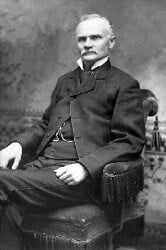
“A glance over the conditions of mankind in this our day with its misery, discontent, and corruption, and disintegration of the social, religious, and philosophic fabrics, shows that this generation has been put into the balance and has been found wanting. A following, therefore, in the old grooves, would simply lead to the same results, and that is what the Lord has designed shall be avoided in Zion. President Brigham Young felt it in his heart that an educational system ought to be inaugurated in Zion in which, as he put it in his terse way of saying things, neither the alphabet nor the multiplication table should be taught without the Spirit of God.”
| Educating Zion, p. 2
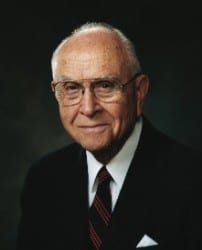
“It would seem that a major underlying cause of divorce is in not understanding that marriage and families are God-given and God-ordained. If we understood the full meaning we would have less divorce and its attendant unhappiness…The current philosophy—get a divorce if it doesn’t work out—handicaps a marriage from the beginning.”
| Marriage and Divorce
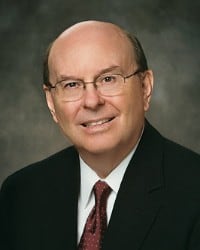
“Sometimes it feels like we are drowning in frivolous foolishness, nonsensical noise, and continuous contention. When we turn down the volume and examine the substance, there is very little that will assist us in our eternal quest toward righteous goals. One father wisely responds to his children with their numerous requests to participate in these distractions. He simply asks them, “Will this make you a better person?”
“When we rationalize wrong choices, big or small, which are inconsistent with the restored gospel, we lose the blessings and protections we need and often become ensnared in sin or simply lose our way.
“I am particularly concerned with foolishness and being obsessed with “every new thing.” In the Church we encourage and celebrate truth and knowledge of every kind. But when culture, knowledge, and social mores are separated from God’s plan of happiness and the essential role of Jesus Christ, there is an inevitable disintegration of society. In our day, despite unprecedented gains in many areas, especially science and communication, essential basic values have eroded and overall happiness and well-being have diminished.”
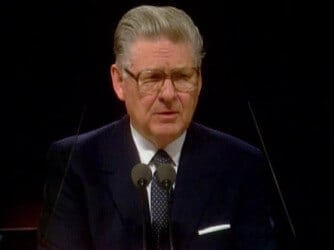
“The intense human intimacy that should be enjoyed in and symbolized by sexual union is counterfeited by sensual episodes which suggest–but cannot deliver–acceptance, understanding, and love. Such encounters mistake the end for the means as lonely, desperate people seek a common denominator which will permit the easiest, quickest gratification.”
| Human Intimacy: Illusion and Reality
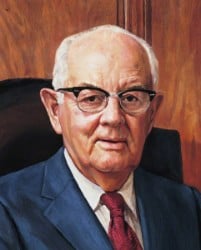
“The union of the sexes, husband and wife (and only husband and wife), was for the principal purpose of bringing children into the world. Sexual experiences were never intended by the Lord to be a mere plaything or merely to satisfy passions and lusts. We know of no directive from the Lord that proper sexual experience between husbands and wives need be limited totally to the procreation of children, but we find much evidence from Adam until now that no provision was ever made by the Lord for indiscriminate sex”
| "The Lord’s Plan for Men and Women,” Ensign, Oct. 1975, 4

“The Lord and His Church have always encouraged education to increase our ability to serve Him and our Heavenly Father’s children. For each of us, whatever our talents, He has service for us to give. And to do it well always involves learning, not once or for a limited time, but continually.
“It is also clear that spiritual learning would not replace our drive for secular learning. The Lord clearly values what you will find in that history book. And He favors not only Spanish verbs but also the study of geography. His educational charter requires that we have “a knowledge also of countries and of kingdoms” (D&C 88:79). There is also an endorsement for questions we study in the sciences. It is clear that putting spiritual learning first does not relieve us from learning secular things. On the contrary, it gives our secular learning purpose and motivates us to work harder at it…Remember, you are interested in education, not just for moral life but for eternal life.
“Part of the tragedy you must avoid is to discover too late that you missed an opportunity to prepare for a future only God could see for you.”
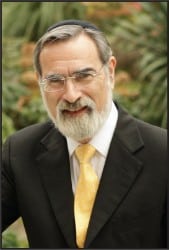
“[Religion] remains the most powerful community builder the world has known . . . . Religion is the best antidote to the individualism of the consumer age. The idea that society can do without it flies in the face of history.”
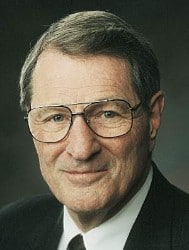
“Those who “live without God in the world” anxiously glean their few and fleeting satisfactions, but they are unable to find real happiness. . . . Ignorant of the plan of salvation, many simply do not know what the journey of life is all about. Therefore, modern selfishness and skepticism brush aside the significance of the Savior. . . .”
| Ensign, March 1998, p. 9
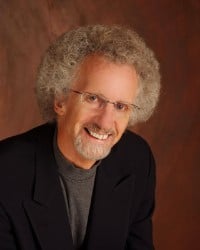
The Sermon on the Mount proves that before God we all stand on level ground:
murderers and temper-throwers, adulterers and lusters, thieves and coveters. We are all desperate, and that is in fact the only state appropriate to a human being who wants to know God. Having fallen from the absolute Ideal, we have nowhere to land but in the safety net of absolute grace.
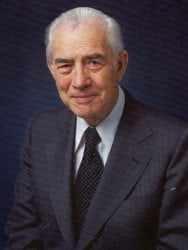
“The Almighty provided that we should observe a sacred Sabbath each week. We have flouted this law to his face, and most of us have turned his holy day into one of pleasure or of ‘business as usual,’ and yet the Sabbath was given as a symbol of allegiance to our Creator.”
| “Warnings from the Past,” Ensign, June 1971, 47.

“Life offers you two precious gifts. One is time, the other, freedom of choice—the freedom to buy with your time what you will. You are free to exchange your allotment of time for thrills. You may trade it for base desires. You may invest it in greed. You may purchase with it vanity; you may spend your time in pursuit of material things. Yours is the freedom to choose. But these are not bargains, for in them you find no lasting satisfaction.”
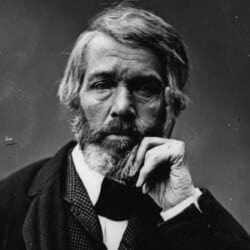
“The man without a purpose is like a ship without a rudder—a waif, a nothing, a no man. Have a purpose in life, and, having it, throw such strength of mind and muscle into your work as God has given you.”
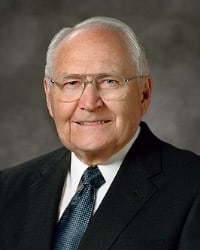
“As we know, [Satan] is attempting to erode and destroy the very foundation of our society—the family. In clever and carefully camouflaged ways, he is attacking commitment to family life throughout the world and undermining the culture and covenants of faithful Latter-day Saints”
| (2012, November). Becoming goodly parents. Ensign, 42(11), 26–28.

| The Neal A. Maxwell Quote Book

“When something is wrong, increasing its commonality cannot really confer respectability.”
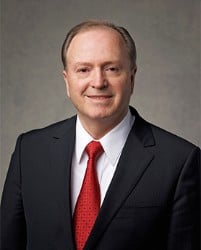
“Lowering the Lord’s standards to the level of a society’s inappropriate behavior is apostasy.”
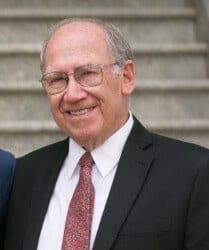
“In a pluralistic society, it is easy to regard different belief systems as equally true. There is one thing a professor can be absolutely certain of; almost every student entering the university believes, or says he believes, that truth is relative.”

“It is curious that physical courage should be so common in the world and moral courage so rare.”

“If you understand the great plan of happiness and follow it, what goes on in the world will not determine your happiness.”
| "The Father and the Family," Ensign, May 1994

“The [current] American story about marriage, as told in the law and in much popular literature, goes something like this: marriage is a relationship that exists primarily for the fulfillment of the individual spouses. If it ceases to perform this function, no one is to blame and either spouse may terminate it at will”
| Protect the children. Ensign, 42(11), 43–46.
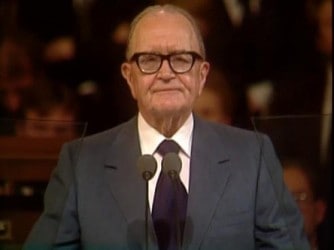
“Thus does Mormon, the prophet, accurately describe our own society [see Mormon 8:36-37) of elegantly dressed, competitive, fashion-infatuated, status-conscious people. Note that the Lord does not stress the ordinary iniquities of crime and immorality, of atheism and lawlessness. Instead he stresses the intolerance, the uncharitable state of mind, and the vanity that exist in our present world. He warns us of the pride, the envy, the arrogance, and the malice that exist in our day. We do not persecute the poor; we simply tend to ignore them and forget them as the prophet predicted. (See Mormon 8:39.)”
| “A Disease Called Pride,” BYU Speeches of the Year, October 13, 1971, p. 4

“Many in the world hold back from making the ‘leap of faith’ because they have already jumped to some other conclusions — often the conclusions of Korihor, which are: God never was nor ever will be; there is not a redeeming Christ; man cannot know the future; man cannot know of that which he cannot see; whatsoever a man does is no crime; and death is the end. (See Alma 30:13-18.) The number of modern-day adherents to the Korihor conclusions will grow.”
| “The Inexhaustible Gospel,” Ensign, April 1993, p. 71

“Those who ‘live without God in the world’ anxiously glean their few and fleeting satisfactions, but they are unable to find real happiness….”Ignorant of the plan of salvation, many simply do not know what the journey of life is all about. Therefore, modern selfishness and skepticism brush aside the significance of the Savior…”
| Ensign, March 1998

“Whether young or old, we need to be good friends, but also to pick our friends carefully. By choosing the Lord first, choosing one’s friends becomes easier and much safer. Consider the contrasting friendships in the city of Enoch compared to peers in the cities of Sodom and Gomorrah! The citizens of the city of Enoch chose Jesus and a way of life, then became everlasting friends. So much depends on whom and what we seek first.”

“What the secularists are increasingly demanding, in their disingenuous way, is that religious people, when they act politically, act only on secularist grounds. They are trying to equate acting on religion with establishing religion. And—I repeat—the consequence of such logic is really to establish secularism.”

“Some men who are evidently unable to gain respect by the goodness of their lives, use as justification for their actions the statement that Eve was told that Adam should rule over her. How much sadness, how much tragedy, how much heartbreak has been caused through centuries of time by weak men who have used that as a scriptural warrant for atrocious behavior! They do not recognize that the same account indicates that Eve was given as a helpmeet to Adam. The facts are that they stood side by side in the garden. They were expelled from the garden together, and they worked together, side by side, in gaining their bread by the sweat of their brows.”
| Ensign, November 1991, p. 51
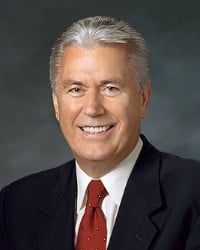
“Not all will follow the map [Heavenly Father has given us]. They may look at it. They may think it is reasonable, perhaps even true. But they do not follow the divine directions. Many believe that any road will take them to a ‘happily ever after.’ Some may even become angry when others who know the way try to help and tell them. They suppose that such advice is outdated, irrelevant, out of touch with modern life. Sisters, they suppose wrong.”
| "Your Happily Ever After," Ensign, May 2010

“Your love, like a flower, must be nourished. There will come a great love and interdependence between you, for your love is a divine one. It is deep, inclusive, comprehensive. It is not like that association of the world which is misnamed love, but which is mostly physical attraction. When marriage is based on this only, the parties soon tire of each other. There is a break and a divorce, and a new, fresher physical attraction comes with another marriage which in turn may last only until it, too, becomes stale.”
| Faith Precedes the Miracle, 130–31
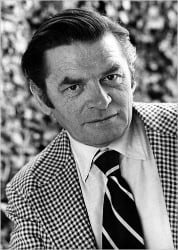
“Our sexuality has been animalized, stripped of the intricacy of feeling with which human beings have endowed it, leaving us to contemplate only the act, and to fear our impotence in it. It is this animalization from which the sexual manuals cannot escape, even when they try to do so, because they are reflections of it. They might [as well] be textbooks for veterinarians.”
| Seven Deadly Sins
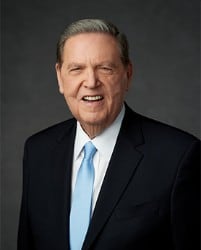
Call it secularism or modernity or the technological age or existentialism on steroids—whatever you want to call such an approach to life, we do know a thing or two about it. Most important, we know that it cannot answer the yearning questions of the soul, nor is it substantial enough to sustain us in times of moral crises.
| Religion: Bound by Loving Ties

“The religious community must unite to be sure we are not coerced or deterred into silence by . . . intimidation or threatening rhetoric. Whether or not such actions are anti-religious, they are surely antidemocratic and should be condemned by all who are interested in democratic government,” he said. “There should be room for all good-faith views in the public square, be they secular, religious, or a mixture of the two. When expressed sincerely and without sanctimoniousness, the religious voice adds much to the text and tenor of public debate.”